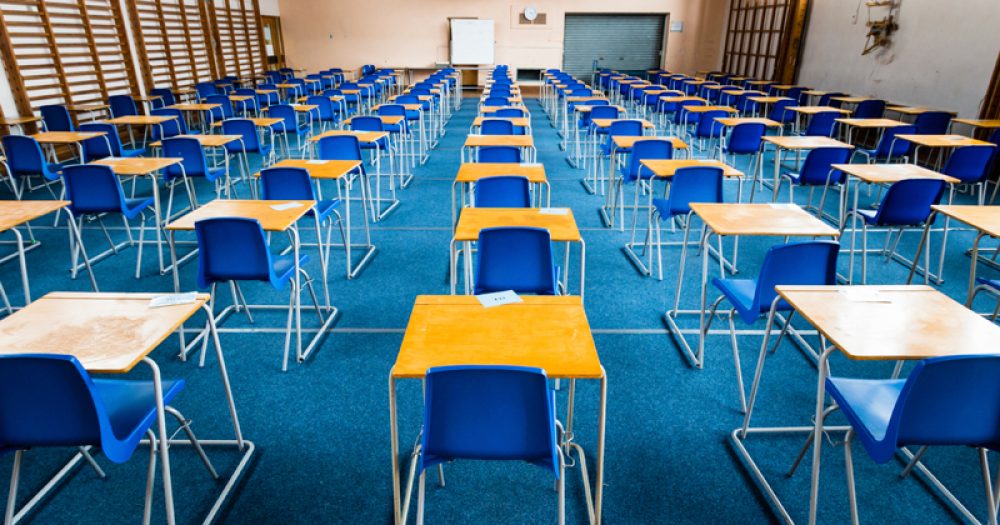Ofqual has dropped the pass threshold for the GCSE science higher tier exams this year, following concerns that too many pupils would receive an ‘unclassified’ result.
In a blog post released today, Cath Jadhav, associate director of standards and comparability at Ofqual, explained that during the awarding period this year exam boards had reported to the regulator that “there were more students than expected getting an unclassified result on higher tier combined science”.
In the reformed combined science GCSE pupils get two grades. Schools will have had to choose whether to enter students for the higher tier paper (targeted at grades 9-9 to 4-4) or the foundation tier (targeted at grades 5-5 to 1-1).
Ofqual had originally set a “safety net” of a grade 4-3 in higher tier science, to scoop up the pupils who fell just slightly below the pass rate of 4-4 but did not deserve an ‘unclassified’ result.
But it has been forced to drop this threshold down to 3-3, to avoid too many pupils getting ‘unclassified’ results on this year.
“When judging results against expectations, exam boards believed that in some cases students should have been entered for the foundation tier,” Jadhav said.
“For some students, if they had taken the foundation tier papers, they would have achieved a grade. Receiving an unclassified result because they had been entered for higher tier would have misrepresented their ability.”
The regulator’s intervention has meant that the exam boards were able to grant a 3-3 pass on the higher tier paper for this summer, matching a grade 3-3 on the foundation tier paper.
Jadhav said the exam boards will be contacting schools and colleges this week to explain the use of the grade and will be “providing further support to them before they make tier entry choices in 2019”.
This full GCSE results for 2018 will be published on Thursday 23, marking the second year of results for reformed GCSEs in England.
In 2017 just English language, English literature, and maths were new subjects, but this year around 90 per cent of the results issued will be for reformed 9 to 1 GCSEs.
The reformed GCSEs were designed contain more challenging content but are still aimed at the same range of students as in previous years.
They are linear as opposed to the former modular structure, meaning students will have taken all their exams this summer.
The reformed GCSE 9 to 1 grades have ‘anchor points’ to help compare with the old A* to G grade scale, with a grade 7 equivalent to an A, grade 4 to a C, and grade 1 to a G.
There will be fewer grade 9s than A*s in previous years, as grades 9, 8 and 7 stretch across what was previous just A* and A. The aim of this is to differentiate more between the most able students.
Schools Week will be reporting the key findings from GCSE results day 2018 on Thursday.







I have posted this comment on Cathy Jadav’s blog
Hi Miss Jadav,
With regards to your comment below:
“When judging results against expectations, exam boards believed that in some cases students should have been entered for the foundation tier. For some students, if they had taken the foundation tier papers, they would have achieved a grade. Receiving an unclassified result because they had been entered for higher tier would have misrepresented their ability.”
I have two questions:
1. Can you be sure this is not also the case for GCSE maths?
2. What about the reverse situation? I undersatand a large number of schools have entered students in the lower tier, particularly in maths and mainly in the FE and 6th form sector, who would otherwise be entered in the higher tier. How does those that have been entered in the lower tier this year, particularly in FE sector, how do their grades match with their expected grades? Has this been checked out too.
Sen
ex- lecturer in maths at Fe and ex- head of Maths at a London Comprehensive
21 August 2018
If new grade 7 is supposedly the equivalent to an old A and 8 presumably the equivalent of an old A*, then there have been two extra grades, 9 and 10, introduced for those classified as the ‘most able’. But the old grades G-D have been squashed into grades 1-3.
It appears that fine tuning is essential for high achievers but low achievers can be lumped more closely together.
And now we hear grade boundaries have been altered to avoid a larger number than expected of higher tier Science candidates becoming unclassified. This could be avoided if higher tier candidates were simply awarded one of the lower grades.
It seems I’m not alone in my concern about the effect of the new system on lower-achieving pupils. Malcolm Trobe, ASCL deputy general, told the Independent the introduction of grades 1-3 was having a negative effect on these pupils:
“That is a very demoralising message to those who achieve grades 1, 2 and 3, and the new system does not work very well for them at all.
“These young people have completed demanding programmes of study and we need to find a better way to credit their achievements.”
https://www.independent.co.uk/news/education/education-news/gcse-results-2018-live-updates-exam-pass-grades-school-latest-news-a8502716.html
The new system suggests the Government dismisses low-achievers: they haven’t got ‘good’ grades and deserve their fate.